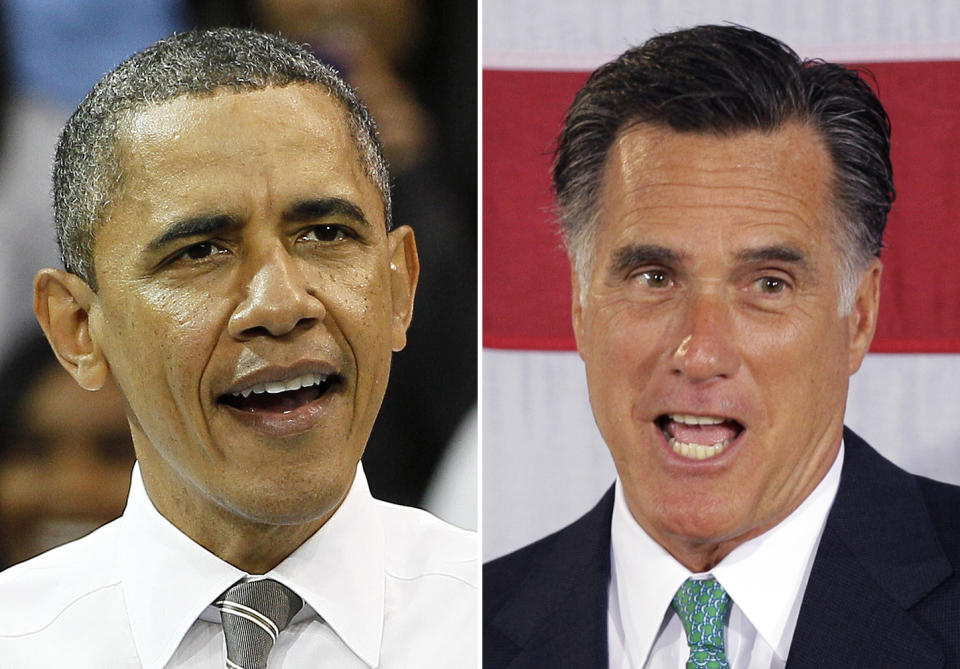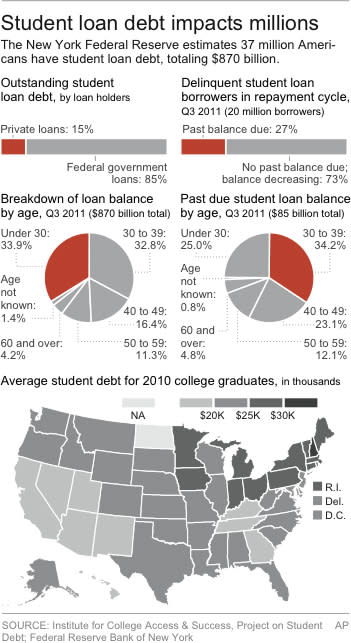Obama, GOP trade swipes in student loan dispute
WASHINGTON (AP) — President Barack Obama is playing politics with his push to prevent interest rates on federal student loans from increasing in an election-year effort to embarrass Republicans, the Senate's GOP leader said Wednesday.
Senate Minority Leader Mitch McConnell, R-Ky., aimed his remarks at Obama as the president spent a second day addressing college campus audiences about the need to keep today's 3.4 percent interest rates on subsidized Stafford loans from doubling July 1.
Obama, speaking to a crowd of students Wednesday at the University of Iowa, said some Senate Republicans appeared ready to support an extension of federal student loan rates. But he said House Republicans were indicating that they would only extend the rate by cutting other student aid.
"They've hinted that the only way they'd do it is if they cut things like aid for low income students," he said. ... Think about that. We're going to help some students by messing with other students. That's not a good answer."
Without mentioning him by name, Obama also took a swipe at Rep. Todd Akin, R-Mo., a GOP Senate candidate who said the government shouldn't be involved in the student loan market and compared it to a "stage 3 cancer of socialism." Obama said, "I don't know where to start. What do you mean? What are you talking about?
"Just when you think you've heard it all in Washington, somebody comes up with a new way to go off the deep end."
The maneuvering highlighted the rivalry between the two parties over appealing to college voters, who leaned heavily toward Obama during his 2008 run for the White House. They are also competing to address the broader financial pressures facing Americans in an economy still struggling to regain strength.
The president supports a bill introduced late Tuesday by Senate Majority Leader Harry Reid, D-Nev., that would keep the rate at 3.4 percent for another year, helping 7.4 million students. The $5.9 billion measure would be paid for by boosting payroll taxes on the owners of some privately held corporations, which Republicans oppose.
"Let's be honest," McConnell said Wednesday. "The only reason Democrats have proposed this particular solution to the problem is to get Republicans to oppose it, to make us cast a vote they think will make us look bad to the voters they need to win the next election."
McConnell said Republicans oppose letting student loan interest rates double, but said the payroll tax proposal would make it harder for businesses to hire workers. He said the two sides' differences could be resolved if Obama would negotiate and "choose results over rallies."
House Speaker John Boehner, R-Ohio, told reporters Wednesday that House Republicans are discussing the student loan problem and "trying to find a responsible way to fix it." He provided no details.
Democrats were happy to fire back.
Rep. Joe Courtney, D-Conn., a sponsor of a student loan bill House Democrats were writing, said the House GOP leadership "so far has hardly shown a flicker of interest in terms of moving this issue."
Rep. Xavier Becerra, D-Calif., a member of the Democratic leadership, noted that House Republicans moved quickly last week to approve a $46 billion tax cut for most businesses that would be paid for by adding to the federal deficit and said, "We are going to attack this as aggressively as we can."
Not willing to cede any ground, Obama's likely GOP rival, Mitt Romney, has also asked Congress to temporarily extend the lower rates. Congressional Republicans say they too support keeping students' interest rates low.
That apparent agreement on the overall goal is not stopping either side from seeking political advantage.
"Republicans in Congress have voted against new ways to make college more affordable for middle-class families, even while they're voting for huge tax cuts for millionaires and billionaires," Obama told college reporters Tuesday by telephone as he flew aboard Air Force One from North Carolina to Colorado, where he addressed university audiences on the subject.
Republicans trained their fire on Democrats' plan to finance the bill by making it harder for owners of smaller, privately owned companies called S corporations to avoid paying Social Security and Medicare payroll taxes on some of their income.
The proposal would apply to such companies with incomes exceeding $250,000 and whose revenues come mostly from the work of three or fewer owners. The higher payroll taxes would also be required for some law firms, doctors' practices and other professional services partnerships.
"The proposal they're talking about is a dream world," Rep. Rob Bishop, R-Utah, said of the payroll taxes.
Senate Democratic aides said their bill would pay for itself with around $6 billion in extra Medicare taxes that would be collected over the next decade from the private companies.
That money would normally go to a Medicare trust fund for financing the hospital care the program provides its elderly recipients. Democrats said their payroll tax language would also raise $3 billion in new Social Security revenue, but that money would go to Social Security's trust fund and not be used to pay for the student loan legislation.
The episode was also testing congressional Republicans' willingness to stand with Romney on issues.
Sen. Pat Toomey, R-Pa., a tea party-supported freshman, would not commit to supporting the overall bill, saying he wanted to study it.
Asked if Romney's endorsement of keeping interest rates low would sway him, Toomey said: "I'm aware of that. We all make our own decisions."
The Obama administration says a doubling of interest rates would cost the average student more than $1,000 over the life of the loan.


